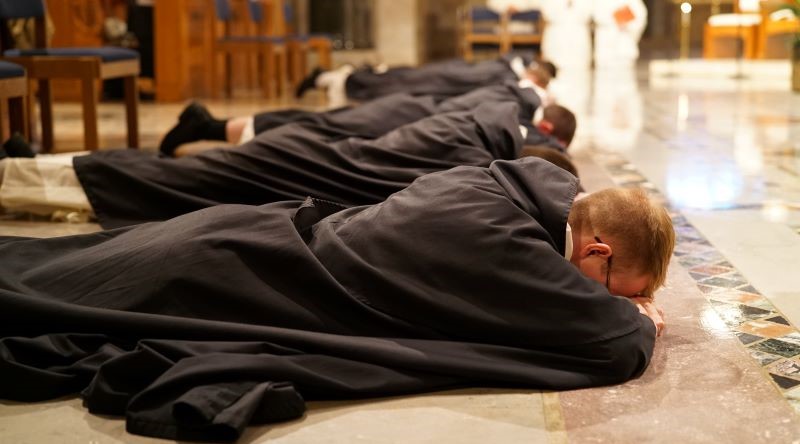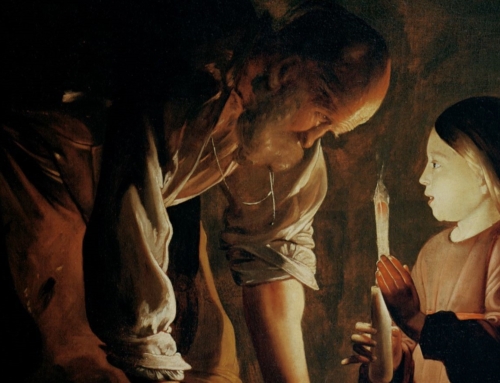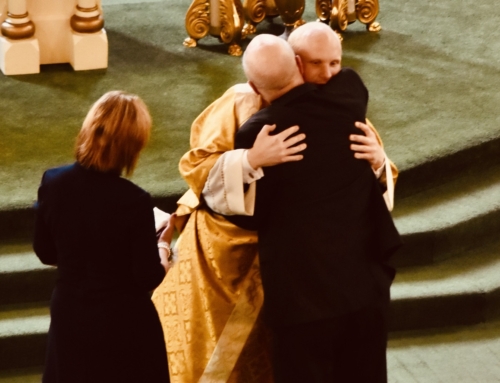Tomorrow, three of my brothers will make a promise that many deem impossible. Five years ago, in their Mass of Simple Profession, I watched them “make profession and promise obedience.” They offered themselves unconditionally to God as Dominican friars. Tomorrow, in their Mass of Solemn Profession, these friars will renew that self-oblation and extend it to the whole of their lives, that is, “until death.”
One post cannot exhaust the mystery of solemn vows. These men will soon joyfully embrace a life that anticipates Christian death, a life forever conformed to the person of Jesus Christ according to the evangelical counsels. One important aspect of this mystery for today is that the act of solemn profession is a preeminent act of theological hope. For love, Divine Love, is indeed “strong as death” (Song 8:6), and “with God nothing will be impossible” (Luke 1:37).
Theological hope is that by which “we desire, and with steadfast trust await from God, eternal life and the graces to merit it” (CCC 1843). Such hope—as these men well know—is not a mere feeling, but rather a supernatural virtue that God infuses into the human will. It embraces God himself as both my own future happiness and as the one by whom I can attain that happiness (ST II-II, q. 17, aa. 1-2). To speak of theological hope is to speak of grace, of which Saint Dominic was the zealous Preacher. As true sons of their holy father, these men can with great confidence lay down their lives before the Blessed Trinity and before their brothers. They seek the mercy of Creator and creatures alike.
The commitment unto death that these brothers will make both illumines and is illuminated by another vocation. There is another total offering of self, one that likewise requires great trust and mercy.
“It can seem difficult,” the Catechism observes, “even impossible, to bind oneself for life to another human being” (CCC 1648). This sentence refers not to religious obedience but to the lifelong, exclusive fidelity that spouses promise each other in sacramental marriage. The man and the woman give themselves to each other “from this day forward, for better, for worse, for richer, for poorer, in sickness and in health, to love and to cherish, until death do us part” (The Order of Celebrating Matrimony, 2016).
By their free consent, two fallible creatures choose to become one before God “until death.” This inseparable union of one man and one woman whom “God has joined together,” becomes in the baptized a sacrament, a sign of Christ’s love for his Church (Mark 10:9; Eph 5:21-33). Husband and wife are told that their marriage is an efficacious sign of divine love, an inexhaustible source of grace for them and their children.
Brothers: By your preaching, you will teach spouses (and spouses-to-be) saving truths about holy matrimony, which they will see only in the obscure light of faith. By your imitation of the poor, chaste, and obedient Christ, you will exemplify the burning charity to which we are all called.
Tomorrow, however, you will be especially a sign of hope. By offering your future to God in this way, you commit yourselves to a supernatural life among fallible men. Failure, discouragement, and injustice may all be included in the “until” of your “until death.” And yet your hope in Divine Love moves you to run towards him, and towards the life and death of a contemplative preacher. You can make your profession without hesitation because you have come to “know and believe the love God has for us. . . . We love, because he first loved us” (1 John 4:16, 19). In this regard, you have much in common with the Christian couple that dares to say “I do.” For our Lord Jesus is stronger than death, and in him death has lost its “sting” (1 Cor 15:56).
Brothers, your solemn profession will be a joyful moment of hope for me, for the Order, and for the Church. May your promise, kept until death by the grace and mercy of God, also be a ray of this same hope for those who will seek and find God’s love in the grace of Christian marriage.
✠
Photo by Br. Benedict Hernandez, O.P. (used with permission)







